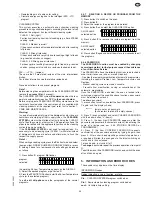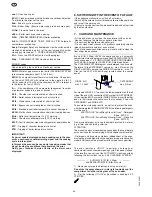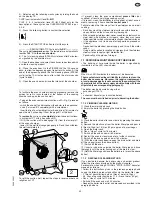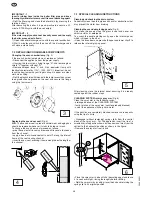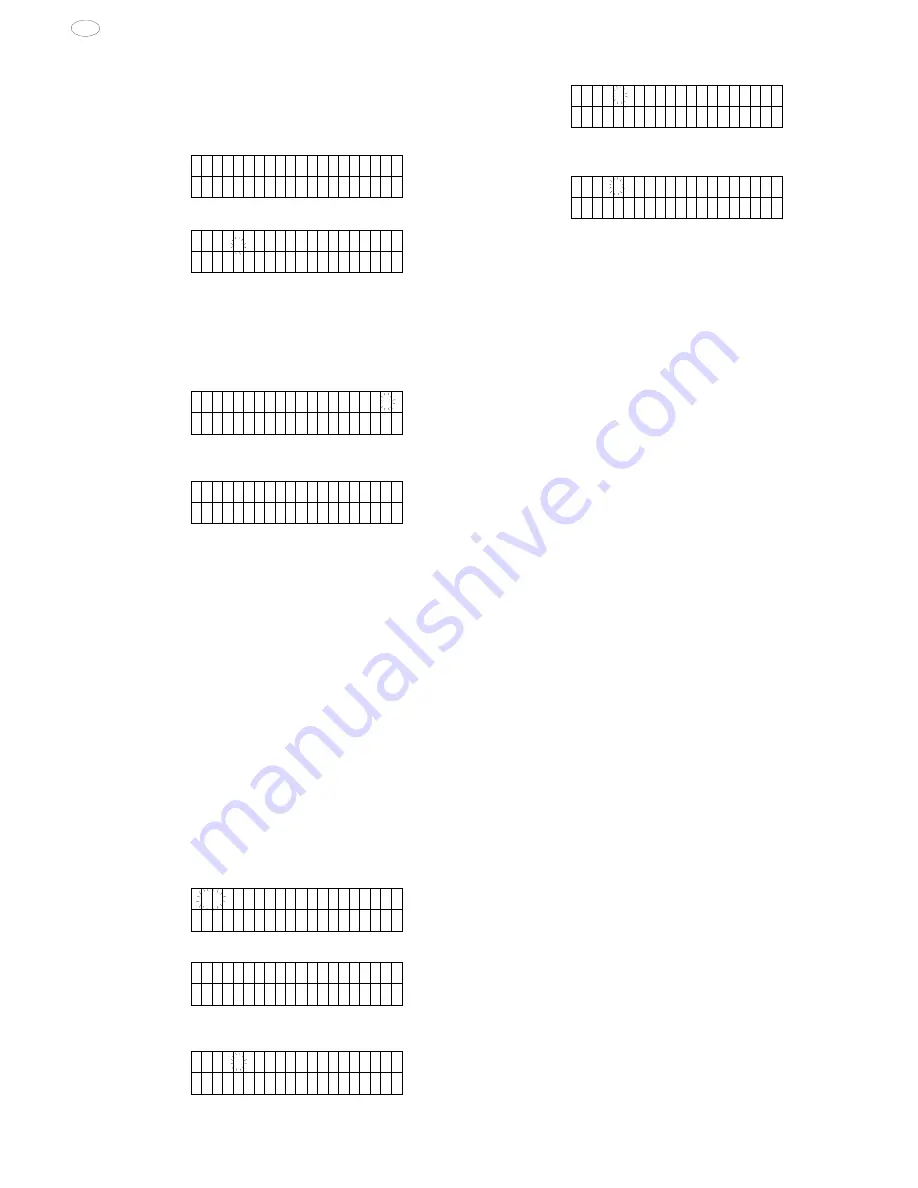
42
GB
5938 033 01
5) Select (while flashing) the RECIPE number in which you want
to store the cycle you have just set up and confirm the number by
pressing button
P
.
6) Select the EDIT NAME option
0 1
selected item
P : E D I T N A M E
7) Press button
P
, the dash "_" flashes.
DASH FLASH.
0 1
_
selected item
P : C O N F I R M
8) Select the first letter required.
9) Press button (
>
) to enter the next letter as described in point 8
and so on for the rest of the letters to complete the description of
the program (to DELETE a letter select the space).
10) Press button
P
to confirm the RECIPE NAME (e.g.: COOKING
CHICKEN).
NAME RECIPE
0 1 C OO K I N G C H I C K E N
selected item
P : C O N F I R M
11) Select the SAVE RECIPE option and press button
P
to save.
NAME OF RECIPE
0 1 C OO K I N G C H I C K E N
selected item
P : S A V E R E C I P E
12) Press button
P
again for a few seconds to exit the programs
(or select the EXIT option and then confirm).
Note
: it is not compulsory to save programs in sequence (e.g. 01-
02-03, etc..): you can assign programs with any number from 0 to
99. Numbers already used for another program are marked with
a dot alongside, while unnoccupied numbers are shown without
a dot.
4.4.5 RECIPE OR PROGRAM SEARCH
There are two methods for finding a recipe or program:
- SEARCH BY NUMBER (recipe or program number)
- SEARCH BY NAME (recipe or program name)
Note:
When setting a cooking cycle, press the P button twice and select
the menu item FIND BY NUMBER OR FIND BY NAME, or press
P, holding it down for a few seconds to exit cycle setting and
proceed a follows.
SEARCH BY NUMBER
Press button
P
and select the desired recipe or program.
SEARCH BY NAME
Press button
P
to open the list of recipes or programs.
program
A O L o w T e m p e r a t u r e
selected
P : ME N U
Press the button
P
and select the item SEARCH BY NAME
program
A O L o w T e m p e r a t u r e
selected
P : SE A R C H B Y N A M E
Press button
P
to begin the search and select the
first letter
of
the name of the desired recipe, e.g. G (GOOSE).
letter G
A O G
flashing
P : C O NF I R M
Press the button
P
to confirm this letter, the first recipe or program
starting with the letter G appears on the display.
first recipe
1 4 G A MM O N
with letter G
P : M E N U
Select the name of the
desired recipe
from those beginning with
the letter G.
desired recipe
1 5 G O O S E
selected
P : M E N U
4.4.6 USING PRESET PROGRAMS
Undeletable preset programs provide several standard service
functions.
The oven is supplied with the following preset programs:
LOW TEMPERATURE COOKING (EFS-LTC)
Cooking at low temperature is a specific cooking procedure
especially for beef, e.g. prime rib, beef fillet, top round, tenderloin,
but also for other meat items like veal, lamb, venison, turkey,
duck, pork, etc
The meat cuts can be: strip loin, shoulder, leg, saddle, T-bone
steak, rump, fillet, chops, etc.
The EFS-LTC is a preset, fully automatic program to obtain
matured, tender and uniform cooked food.
The program comprises 4 main phases:
PREHEAT, SEARING, MATURE, HOLD.
Set the program as indicated below for the pre-sorted programs.
When the word LOAD appears on the large display, after the
PREHEAT phase
(If necessary change the already set cooking chamber
temperature)
PLACE the food in the oven and insert the 6 Point Multi Sensor,
core probe.
(If necessary change the already set probe temperature).
Close the door and start the cycle by pressing the START button
again.
The SEARING (sealing of the food by dry heat) phase starts,
followed by the suddenly Cool Down for subsequent slow
cooking; in the MATURE phase (responsible for tenderising the
meat) the relevant duration flashes on the large display of the
core probe (press any button and the duration disappears).
This is followed by the final HOLD phase to keep the food on a
certain temperature.
The entire LTC cycle (including the HOLD phase) can last for a
max. of 24 hours.
One or more phases can be skipped, going to the next phase
(see SKIP PHASE in par. 4.4.1 AUTOMATIC SEQUENTIAL
MULTIPHASE COOKING); this is useful, for example, when
cooking is started (SEARING phase) with another appliance
(e.g. fry top) and is to be completed in the oven (MATURE and
HOLD phases).
The MATURE phase cannot be skipped; this means that if only
the HOLD phase is to be used just set the relevant UTILITY (see
par. 4.3.9 UTILITIES).
Major advantages:
• Excellent food quality.
• Standardized procedure LTC guarantees repeatable
results
year-in - year-out.
• Typical roast aroma, juiciness from centre to the rim.
• Uniform colour and perfected evenness in the degree of
doneness.
• Fast maturing process - time saving and use of fresh cut.
• Significant less cooking shrinkage, 5-8 % (depend on food
quality and selected core temperature).
















